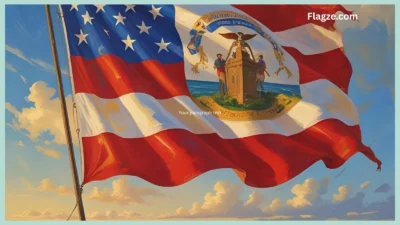Last Updated on August 7, 2025 by Mustafa Riaz
Flagging is about more than simply waving a piece of cloth. It’s about symbolizing something greater than oneself—be it a nation, a movement, or a people. In Georgia, flags have been deeply symbolic. They are not objects for mere decoration. They are symbols of pride, unity, and identity. In Georgia, a flag is not merely an ornament; it’s a mode of communication, conveying strong messages to the world.
Table of Content
Introduction to Flagging in Georgia

In this paragraph, Georgia’s flagging has never strayed far from the nation’s past and trials. Since ancient times to the present-day movements, flags have been an integral part of signifying pivotal moments of transition. In the time of the Soviet Union, for example, flags were used as a means of asserting nationalism and opposing foreign occupation.
Even now, the Georgian flag is a logo of independence and freedom, its boldness representing the strength and resilience of the country. The history of flagging in Georgia is not merely one of colors or designs, but of what they symbolize: hopes, dreams, struggles of the people who stand behind them.
Political Flagging in Georgia
In Georgia, flags manage to do more than simply sit atop poles—they tell tales, express support, and even ignite revolutions. Political flagging, particularly around elections or protests, is one means by which individuals make an express statement. Political rallies abound with flags.

The flags wave high come election time. It denoting the power and numbers supporting the candidates, and in demonstrations. Whether it’s a flag draped with the party logo or simply the flag of Georgia flying high.
People use these symbols to align themselves with the political agenda they believe in. The same applies to protests. Flags in Georgian politics are political power symbols that express unity and a call for change. They do not simply symbolize a movement—they symbolize hope and a struggle for a brighter future.
State Flag of Georgia: Symbolism and History
Georgia’s state flag is not just a patch of cloth; it’s a shard of the country’s soul. Georgia was the first to embrace Christianity as its state religion back in the 4th century, and this flag proudly boasts that heritage.
The color red of the crosses symbolizes strength and courage, while the white background points to peace and solidarity. It’s a design that depicts the tale of Georgia’s resilience, struggles, and faith, all in one look.

If you know that the flag itself has changed over time, but the significance there of has remained constant. It’s more than a national symbol—it’s a symbol of Georgia’s unbroken identity and spirit. Amidst the political turmoil of the years, the flag remained steadfast as a symbol of defiance and pride. Whether it was waved at a time of tranquility or held high against adversity, the Georgia state flag has always served as a reminder of the country’s heritage, its religion, and its ongoing pursuit of freedom and justice.
Controversial Flagging Events in Georgia
Not all flag-waving in Georgia has been patriotism and nationalism—there have been times when flags have been emblematic of political resistance and discontent. One such turning point was during the Rose Revolution in 2003, when flags were at the forefront of protests against the government. Georgians protested in the streets, waving flags, and calling for reform.
It wasn’t merely about voting for a political candidate—it was about fighting for democracy, for freedom, and for the country’s future. The image of protesters holding the Georgian flag, or revolutionary flags, was descriptive of the people’s unity and power. It was a visual representation of their call for a government, a future, which was better.
Flagging in Sports in Georgia
Sports in Georgia are not games—sports are a source of pride, passion, and unity. Flag waving at big sporting events like football, rugby, and cricket is a big part of the way fans show their support. Flags are ubiquitous—flying high in the stands, wrapped around shoulders, and waved vigorously by supporters. No matter if it’s a local tournament or an international game, flags are at the heart of the fan culture, evoking an atmosphere of enthusiasm and communal spirit.
For Georgia’s national teams, flags are even more meaningful. They embody the hopes and pride of a nation as a whole. As the players enter the field of play, the flags in the stands are a symbol of unity, indicating that wherever the team travels, they have the unrelenting support of their fans. In Georgia, flag waving at sports events is more than expressing support; it’s a means of portraying the country’s toughness and affection for sport.
Fan Culture & Flagging in Georgia
To Georgian sports enthusiasts, flags are not simply for show; they are a symbol of allegiance and pride in their teams. It’s football, rugby, or basketball, the Georgian fans proudly carry flags, shout loudly, and sport team colors proudly. The flags are seen in the stadiums, at home, and even on the streets prior to and after games. They are a connection between fans and their teams, something greater than just watching a sport—it’s identity and community.

Flagging is a significant aspect of Georgian fan culture, particularly in relation to national and local pride. It’s a sign of allegiance for fans and unity. These flags become a symbol of loyalty and passion, showcasing the strong connection between the people of Georgia and the sports they love
Georgia’s International Sports Representation and Flagging
Georgia’s presence on the international sporting scene is something that’s taken seriously by fans. In international football qualifiers, rugby competitions, and international cricket tournaments, the Georgian flag flies high at the international level. It’s not merely about cheering the team; it’s about making the world realize that Georgia is here to stay in the sporting arena. Flags are waving in the stands at international competition, representing the pride of the nation and the resolve of its athletes.
When Georgia plays abroad, the flag serves as a visual symbol of the spirit and aspirations of the country. It’s a symbol of national pride for players and fans alike. The flag at these games is a strong declaration of Georgia’s increasing role in international sports, and therefore plays a crucial role in every match.
Flagging in Cultural and Social Movements in Georgia
Flags have been a strong symbol in Georgia’s social movements for ages, symbolizing not just unity but protest as well. Through the ages, flags have been employed to send messages of change, justice, and equality. Whether as a voice for human rights, civil rights, or social movements in communities.

When threatened by political repression or social injustice, individuals have looked towards flags in a quest for expression. To illustrate, flags have flown during demonstrations demanding democratic change, justice for minorities, or the preservation of civil rights.
Apart from political movements, flags in Georgia also form an integral part of the local cultural identity. Local and indigenous communities tend to use flags to maintain their tradition and express their own distinctive cultural identity. These flags symbolize a greater meaning, outlining the tradition, faith, and practices of various regions. For instance, flags employed by the local groups within Georgia’s mountainous areas tend to be unique in design, representing the history and values of the community. These flags, besides being a representation of community unity, also remind the people of how crucially important it is to continue preserving their local culture and identity in a rapidly changing world in modern Georgia.
Flagging Laws and Regulations in Georgia
In Georgia, flagging is not only cultural and social—legally regulated as well. The exhibition of flags is subject to some legal rules guaranteeing national symbols their due respect. For instance, national flags are required to be hoisted at precise heights and in specific locations on official events. They are made to maintain the dignity and importance of flags as national symbols.
Flag protocol also has an important place in Georgia. Respect shown towards flags is a national issue. This indicates the utmost respect the Georgians have for their national emblem, and also their dedication to upholding the honor and reputation attached to the flag.
Modern Trends in Flagging in Georgia
As with most things in life, flagging in Georgia has changed in the digital era. Social networks and online tools have created new methods of displaying flags. Flag emojis and online flags have become a means of people expressing their national pride. the political movement support, or solidarity with social issues.

For instance, Georgian people and political activists now employ social media to transmit digital versions of the Georgian flag in order to make their voices heard in regards to issues affecting the world or indicate support for global causes. This digital flagging signifies the contemporary transformation in how individuals participate in national and social movements in an increasingly networked virtual world.
By the same token, the use of flags in urban and rural parts of Georgia is indicative of the discrepancies in regional and cultural identity.
In these rural regions, flags are at times associated with traditional ways of life and are utilized to indicate membership in certain tribes or communities. These nuanced but significant flagging differences indicate the way flags can not only represent national pride, but also the particular identity and heritage of regional communities within Georgia.
Conclusion
Summary of Key Points:
Flag-waving in Georgia is a lot more than waving a flag at a sporting event or festival. It is a highly emotive expression of togetherness, resistance, and ethnic identity. Whether utilized in political activism or maintaining local cultural heritage, flags in Georgia are used as icons of pride, rebellion, and belonging. From constitutional flag protocol and statutory law to contemporary popular culture in digital flagging, flags remain at the center of national discourse.
Future of Flagging in Georgia:
In the future, the function of flagging in Georgia will also keep changing. With political transformations, increasing power of online platforms, and new cultural values, flagging will probably be even more prominent in reflections of national pride, social movements, and community identity. Whether by means of historical flag waving or online activism, the future of flagging in Georgia will be an echo of shifting national and popular dynamics, responding to new challenges while retaining the fundamental values that make flagging a lasting emblem of unity and expression in Georgia.



